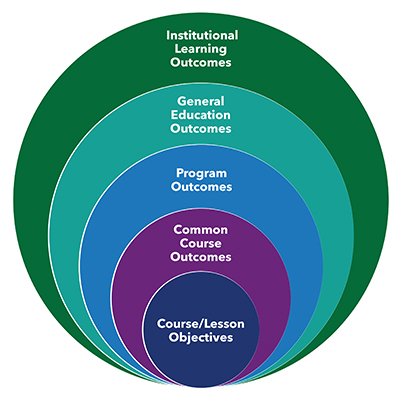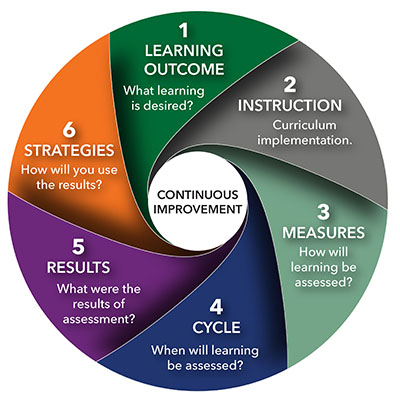Student Learning Assessment
Assessment is the continuous process of collecting, analyzing, and utilizing data to understand and improve student learning. Assessment serves as a tool for educators to improve curriculum and instruction and ensures consistent learning expectations are applied to all programs, courses, general education, and co-curricular areas of the College. It is also a critical component of Institutional Effectiveness, and a requirement of the Higher Learning Commission (HLC) and other accrediting bodies. Finally, assessment demonstrates OCC’s high academic standards to students, transfer institutions, employers, and other stakeholders.
At OCC there are Institutional Learning Outcomes (ILOs), General Education Outcomes (GEOs), Program Outcomes, Common Course Outcomes (CCOs), and co-curricular outcomes that are connected to course lessons/objectives and co-curricular activities.

Institutional Learning Outcomes (ILOs)
ILOs represent educational values of the College and describe knowledge, skills, and abilities that all OCC graduates should develop through their experience at the College. Each OCC graduate should be exposed to curricular and/or co-curricular learning opportunities associated with all ILOs. Oakland Community College's ILOs are:
- Graduates will display knowledge and appreciation of diverse human cultures and environments.
- This ILO is assessed through multiple methods connected to dimensions of OCC's General Education Outcomes of Global Understanding & Responsibility and Aesthetic Awareness.
- Graduates will apply foundational skills.
- This ILO is assessed through multiple methods connected to dimensions of OCC's General Education Outcomes of Effective Communication- Oral & Written, Quantitative Literacy, Information Literacy, Scientific Literacy & Critical Thinking.
- Graduates will demonstrate personal and social responsibility.
- This ILO is assessed through multiple methods connected to dimensions of OCC's General Education Outcomes of Social Responsibility & Personal Development.
General Education Outcomes (GEOs)
GEOs support the ILOs and describe knowledge, skills, and abilities that OCC students should develop after completing general education coursework. There can be considerable overlap between ILOs and GEOs; however, unlike ILOs, students will encounter at least one GEO dimension in each course at OCC even if they may not be exposed to learning opportunities associated with all GEOs through their program of study.
Program Outcomes
Program outcomes describe knowledge, skills, and abilities that OCC students should develop after completing a particular program at OCC. Program outcomes are often cumulative and reflect student learning achieved across multiple courses within a program. Program outcomes are the essential learning concepts needed to obtain employment or to support advanced education in a particular field.
Common Course Outcomes (CCOs)
CCOs describe knowledge, skills, and abilities that OCC students should develop after completing a particular course. At least one CCO in each course is mapped to a GEO, such as critical thinking or information literacy.
Course Objectives
Course objectives describe concepts or topics taught in a particular course and are the building blocks for successful learning of a CCOs. Faculty track student learning within course objectives to support overall learning in a given course.

Student Learning Assessment follows a continuous quality improvement cycle. As such, faculty develop assessment plans to measure student learning on developed outcomes. Plans for each outcome include a specific benchmark (learning target), and assessment method (rubrics, exams, papers, activities, etc.). After assessment plans are complete, faculty and administration manage student learning assessment data through the eLumen assessment software. When student learning falls below the learning target action plans to improve curriculum, pedagogy or the assessment plan are developed and tracked to be sure the action is effective in increasing student learning.
Who is Involved in Student Learning Assessment at OCC?
Assessment at OCC is a collaborative process involving faculty and staff, with student learning and student success as the core focus. OCC faculty take the lead in developing learning outcomes and implementing assessment activities across the College to measure student learning. The Student Outcomes Assessment Committee (SOAC) is an advisory committee of faculty and academic staff committed to continuous improvement of student learning at the College. The Office of Institutional Effectiveness and SOAC provide support to OCC faculty in all assessment-related matters. The College supports assessment further by employing faculty assessment mentors as identified leaders for student learning assessment in their respective divisions.
Student Learning Assessment Data
At OCC, faculty and administration manage student learning assessment data through the eLumen assessment software where data is entered, housed and used for analysis.
Contact Information
Institutional Effectiveness
Assessment, Accreditation, and Quality
Phone: (248) 232-4200